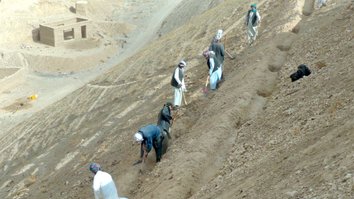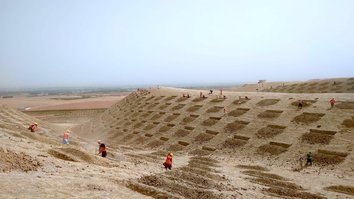FARYAB -- The World Food Programme (WFP) has launched a "farming for cash" project to employ 800 individuals to rehabilitate pistachio farms in Faryab province.
The six-month project began January 21, and will cover 1,000 hectares of land in six locations across the province, according to Ezatullah Noorani, chief of Faryab's Agriculture and Livestock Department
The project will rehabilitate about 1,000 hectares of "pistachio forests", which have been affected either by natural disasters or illegal deforestation, he said.
The WFP is financing the project with a total budget of about 34 million AFN ($337,000), he added.
"The project is being implemented in the villages of Kohi Khana, Oncha Alat, Jamshidi, Toor Pakhto, Talshi Gurzar and Nawabad on the outskirts of Maimana city, the capital of Faryab province," he told Salaam Times.
"Those hired under the project were identified beforehand, and they will be paid 320 AFN ($3.18) daily and expected to work 22 days a month," he added.
Noorani said the provincial directorates of Agriculture, Disaster Preparedness, Economy, Refugees and Rural Development are jointly overseeing the project to ensure its effective implementation.
"Faryab's climate is suitable for agriculture. We prioritised the rehabilitation of the pistachio forests [farms] because most of these farms have been damaged by natural disasters. We intend to expand pistachio forests in the future," he said.
The project consists of two phases, according to Noorani.
Digging, cleaning and planting pistachio seeds make up the first phase. The second phase entails constructing 500 metres of retaining walls to protect farmers' agricultural lands against possible flooding in the suburbs of Maimana.
"Floods destroy ... our agricultural land every year. With the construction of gabion walls along riverbanks, I hope our farmers' lands and 1,450 residential houses will be protected against possible flooding," Noorani said.
Vital income
Workers have welcomed the launch of the project, saying that it will help address their economic problems.
Mohamad Reza, 44, a resident of Maimana city, told Salaam Times that he feels very grateful that he is now employed on a six-month contract after not having been able to find a job for the past several months.
"I am a labourer and have not worked for the past four months. I did not have stable income under the previous government, but the unemployment rate was not at the level that I see now," he said.
"My children have been sleeping on empty stomachs at night, and nobody supported us. Now that I have a job, I am thankful to Allah Almighty for listening to my plea and blessing me with a job," he added.
"I earn 320 AFN daily and can bring enough food to feed my children. By doing so I am not only rebuilding my country but also economically supporting my family," said Reza.
"We shovel and prepare a farm in Kohi Khana village for sowing of pistachio seeds," said Rafiullah Tooghan, 36, another worker employed under the project in Shirin Tagab district
"Once the land is ready, agriculture officials come and sow the ... seeds."
"Shoveling is ... a chance to rebuild my country. If there is security, we can work more effectively and build a good future for us all, but if the situation is bad, no one will feel safe," he said.
"With every single step taken toward building our country, the people feel more content," said Tooghan.
Developing agriculture
Faryab residents have also praised the agricultural projects for addressing environmental challenges and climate change impacts.
"Forests play an effective role in mitigating the adverse impacts of climate change, including reducing winter cold and summer heat," Rahmatullah Ahmadi, a student in the agriculture faculty at Faryab University, told Salaam Times.
"If these forests grow, they will not only improve the economic status of the public and government, but they will also make the air clean and pleasant," he said.
"Forests are very effective in preventing the destruction of local fertile soil by strong winds and rain," he added.
"Forestry not only produces edible fruit but also wood for building houses, and environment-friendly material for keeping homes warm," said Ahmadi.

![A number of Kohi Khana village residents in Faryab province are seen in this photograph taken January 24 as they participate in a 'work for cash' project funded by the World Food Programme. [Faryab Agriculture and Livestock Department]](/cnmi_st/images/2022/02/01/33819-d-585_329.jpg)






